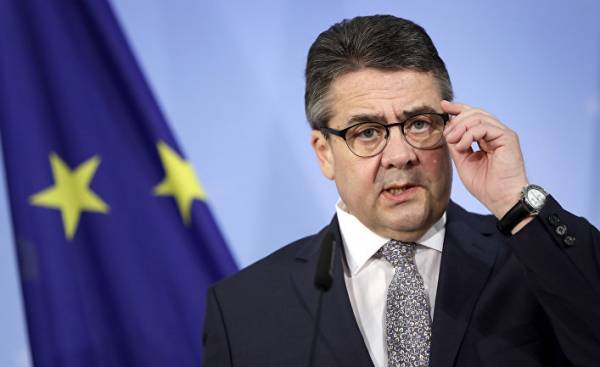
27 July the us Senate voted for the new package of restrictive punitive measures against Russia, Iran and North Korea. Two days before the bill was approved by the absolute majority in the House of representatives. Now the document sent for signature to the President of the United States and must be signed in the coming days. The basis for the adoption of sanctions against Moscow is the continued annexation of Crimea, as well as hacker attacks from Russia, with the aim to influence the presidential elections in the United States. The bill, in particular, provides for sanctions against those companies that are involved in the construction or repair of Russian export pipelines. That is in fact primarily against German business. It is particularly noteworthy that at the same time openly declared strategic goals of Washington, which are tied to the need to expand the supply of liquefied gas from the US to the European market and displace Russian gas in Europe.
For the official Berlin, the decision of American lawmakers has become, without exaggeration, a real shock. And it’s not that the American side took this decision without any consultation with its major European allies. After all, this bill actually directly hits on the German business, which has traditionally close ties with the Russian energy sector. First of all new U.S. sanctions put into question the very future of the pipeline “Nord stream-2”, according to which the Russian “blue fuel” should the Baltic sea be delivered to Germany and further to other EU countries.
It should be recalled that German business has never been a particular supporter of the policy of sanctions against Russia. But until recently, entrepreneurs from Germany, expressing his criticism, still operated within the framework of the official policy of Berlin. This time the situation is fundamentally different. Sanctions against Russia slams already and the leadership of the Federal Republic, which is well aware that Germany as a result of not just will suffer serious economic losses, but also in full growth will have to address the issue of energy security. “We believe these sanctions are definitely contrary to international law”, — it is this dramatic statement came from the mouth of the Federal Minister of economy, zipris Brigitte (Brigitte Zypries). In an interview July 31, the politician reminded that “the Americans can’t punish German companies for their business activity in another country.” According to representatives of the SPD, Berlin will try to seek a compromise with Washington in order to the United States went from a single “line in the development of joint sanctions.”
A similar position was taken on the eve of the foreign Minister of Germany, Sigmar Gabriel (Sigmar Gabriel). “We remain unconvinced that in any case will not support extraterritorial application of us sanctions against European companies”, — firmly said the head of the German foreign Ministry. It is noteworthy that German politicians agree with other European countries, e.g., Austria. Federal Chancellor of the Republic of Alpine Christian Kern (Christian Kern) noted that we “cannot tolerate threats of sanctions against European companies that are involved in energy supply throughout Europe”.
The German press in the American bill generally characterized as “a Declaration of economic war of Russia”. This indicated that the punitive measures the United States seriously undermine us-European unity. It seems that it understands and the citizens of Germany. So, according to the results of a poll Institute Forsa, commissioned by the Kassel company Wintershall, which is the “daughter” of the German giant BASF, 83% of respondents believe the introduction of new economic sanctions against Russia “wrong” and only 6% approve of them. At the same time 77% of respondents believe that in this case the United States really only seek to strengthen the position of its own economy. 86% of respondents support the position of Berlin, sharply critical of the anti-Russian sanctions by Washington. By the way, the Federal government is considering now the possibility to impose countermeasures against the United States.







